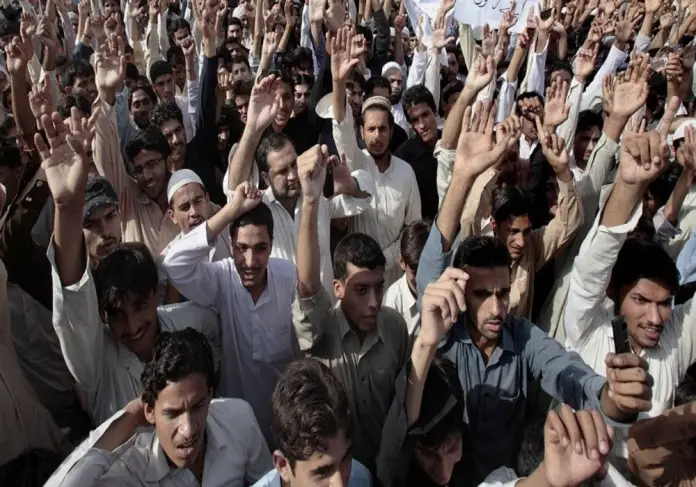As anywhere else, political instability provides an opportunity for local scores to be settled, for personal grievances to be aired, for heroes to be acclaimed and discarded, giving full reign to the fickle fortunes of war, writes Charles Emmerson in his book titled 1913, In Search of the World before the Great War. Well said, but the best said, though worrisome, is the last part, “giving full reign to the fickle fortunes of war”.
Political instability, for the writer, is postulating war, in fact and effect, both. The continuum, starting from unrest and approaching political instability, can be a wholesome application or be applied in bits and pieces. It seems to be governed by the famous laws of motion, which provide for body at rest to remain at rest and a body in motion to remain in motion, inability to change its state, in the absence of a net force.
It can be an outcome of interplay of external and internal forces working on/in a state, if left unattended, leaving it languishing in a state of war.
Persistence of political instability across the globe is one of the main reasons for nations being underachievers or complete failures. A cause and effect analysis of political instability is given, in succeeding lines. Causes can be enumerated, in multiples, however they together highlight a common denominator too. Foremost is the denial of basic human rights and liberties which imparts an effervescent effect to unrest working up to instability. The talk of rights and liberties seem to be a cornerstone for a progressive society but then the society itself is expected be more responsible. Why so, because sans responsibility, it can turn out to be a major cause of upheaval too.
Rampant corruption is yet another reason. It permeates unrest and that too under the watchful eyes of corrupt leadership, itself.
Mismanagement of state’s wealth has got deeper motives at the core. It incurs an additional cost by putting some sort of national interest(s) up for sale.
Overt and covert facilitations to the hostile country or non-state actors have got financial kickbacks at the base of it, in one way or the other. And it is not only the financial paradigm which defines corruption, it is in fact the misuse or more rightly worded, is the abuse of power which complements it. Disregard to merit and preferential/discriminatory treatment to federating or constituting units of a state is yet another form of corruption. Lack of transparency of the government irks the mindset of a common man. Dire economic conditions under which masses are made to toil creates lack of opportunities fueling unrest and instability.
Religious and ethnic intolerance further aggravates the situation.
We have witnessed erosion of the social fabric due to intolerance not only in countries in Africa and likes of India and Afghanistan, but also within Pakistan. Religion and sectarian card have been played by our adversaries as and when required to destabilize us, posing a major challenge. Authoritarian regimes clinging to power for long, against the wishes and aspirations of its people are yet another breeding ground for instability.
The profound effect of the causes, impedes the progress to sustainable development. Basic human rights, hinging on freedom of expression can act as a double-edged sword, if not practiced responsibly. I have already pointed this out as a “A Great Question” published a few weeks back on this website, which arises when it results in blasphemy, defamation, inciting strife or it turning out to be anti-state. Irresponsibility on part of some, makes responsible, the wholesome. It becomes increasingly pertinent to first check out our intellectual baggage, once we arrive at the door step of a debate. Nevertheless, the society needs to agree on how to disagree, how to form and hold opinions and ideals and above all how to stand for them. It is the only way forward to raise an all-inclusive and stabilized society, with law taking its due course where required.
It has become a norm these days to play down corruption as a secondary issue whereas it consumes the roots of a nation’s morality. It creates a perception amongst masses that only few are making hay while the sun is shining and they are left outs. The ripples this mindset makes, amplify to being waves of dissent and discord, more on part of lesser who think they are left outs and less on part of more, who are not willing to take on this moral stigma and are righteous. In the ongoing vicious circle of making both ends meet, the righteous ones remain so preoccupied that they are the last to raise their voices. This demon of corruption has got the capacity and capability to make the nations fall on their knees, if not checked.
Economic conditions are inversely proportional to corruption indices, worsening economies are liable to see burgeoning corruption. Unemployment rules the roost, merit is damned, youth which is the future of any nation, gets disenchanted. Resultantly, brain drain occurs, leaving a harrowing void of skills and expertise in the country. The management of the country falls on the shoulders of few immoral, inept and incompetent people and the rest his history. Religious and ethnic intolerance instils fear, which is counterproductive to nation building. The common denominator referred to earlier is the government, which is responsible to obviate the causes and mitigate the effects of political instability which can be home grown or externally incited, both. Oppositions, who thrive on opposing, may or may not act responsibly, depending on the overall societal attitudes, but for sure need to be engaged, rendering, what Charles Emmerson was quoted above for, ineffective, thus altering the state of “stability of political instability”.






